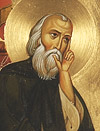

| Previous day | Next day |
| Old Style
April 30
|
Sunday |
New Style
May 13
|
| 6th Sunday of Pascha. Sunday of the Blind Man. Tone 5. | No fast.
|
![]() Holy Apostle James, the brother of St. John the Theologian (44).
Holy Apostle James, the brother of St. John the Theologian (44). ![]() Uncovering of the relics of St. Nicetas, recluse, of the Kiev Caves, bishop of Novgorod (1558).
Uncovering of the relics of St. Nicetas, recluse, of the Kiev Caves, bishop of Novgorod (1558). ![]() St. Ignatius (Brianchaninov), bishop of the Caucasus and Stavropol (1867).
St. Ignatius (Brianchaninov), bishop of the Caucasus and Stavropol (1867).
St. Donatus, bishop of Euroea in Epirus (ca. 387). Uncovering of the relics of Hieromartyr Basil, bishop of Amasea (4th c.). Martyr Maximus of Ephesus.
Icon of the Most Holy Theotokos “Of the Passion.”
Martyrs Eutropius and Estelle, of Saintes (Gaul) (3rd c.). St. Erconwald, bishop of London (ca. 693). St. Clement the Hymnographer, abbot, of the Studion (9th c.). New Martyr Argyra of Prusa, at Constantinople (1725).
Repose of Schema-abbess Martha (Protasieva) (1813), disciple of St. Paisius (Velichkovsky), and Hieromonk Clement (Sederholm) of Optina Monastery (1878). Slaying of Priest Igor Rozin of Tyrnyauz (Kabardino-Balkar Republic, Russia) (2001).
Thoughts for Each Day of the Year
According to the Daily Church Readings from the Word of God
By St. Theophan the Recluse

Sunday of the Blind Man. [Acts 16:16–34; John 9:1–38]
Simplicity of faith argues with crafty unbelief. Faith, coming to the blind man who received sight, enlightened his mind’s eyes, and he clearly saw the truth. See how everything was logical for him. They ask him: what do you say of Him who gave you sight? He is a prophet, he answered, that is the messenger of God, clothed in miracle-working power. An indisputably true conclusion! But learned erudition does not want to see this trueness and seeks to evade its consequences. However, this being impossible, it approaches unlearned simplicity with the suggestion: give God the praise: we know that this man is a sinner. Simplicity of faith does not know how to connect these concepts—sinfulness and miracle-working, and expresses this openly: Whether he be a sinner or no, I know not: one thing I know, that, whereas I was blind, now I see. What can one say against such deduction? But the logic of the unbelievers is obstinate, and even in the face of obviousness it is not ashamed to affirm that it does not know where he who opened the blind man’s eyes is from. Why herein is a marvellous thing, the sensible logic of faith says to them, that ye know not from whence He is, and yet He hath opened mine eyes. Now we know that God heareth not sinners: but if any man be a worshipper of God, and doeth His will, him he heareth. Since the world began was it not heard that any man opened the eyes of one that was born blind. If this man were not of God, He could do nothing (John 9:17–33). It would seem as though after this nothing remained other than to bow down before the power of such a conclusion. But learned erudition could not stand the sensible logic of faith, and drove it away... Go now, prove the truth of the faith to those whose mind has been corrupted with obstinate unbelief. The unbelievers of all times are cut from the same cloth.
Articles
 Apostle James the Brother of St John the TheologianThe Holy Apostle James, the son of Zebedee, was the brother of Saint John the Theologian, and one of the Twelve Apostles. |
 Venerable Nikita of the Kiev Caves, Far Caves the Bishop of NovgorodSaint Nikita, Bishop of Novgorod, in his youth entered the Kiev Caves monastery and soon wished to become a hermit. |
 St. Donatus the Bishop of Euroea in EpirusSaint Donatus lived during the reign of the holy Emperor Theodosius the Great (379-397) and was bishop of the city of Euroea (in Albania). |
 Hieromartyr Basil the Bishop of AmaseaThe Hieromartyr Basil, Bishop of Amasea, lived at the beginning of the fourth century in the Pontine city of Amasea. |
 Martyr Maximus of EphesusThe Holy Martyr Maximus suffered for his faith in Christ. |
 New Martyr ArgyraThe holy New Martyr Argyra lived in Proussa, Bithynia, and came from a pious family. She was a beautiful and virtuous woman. |






